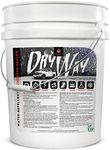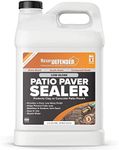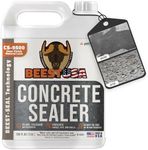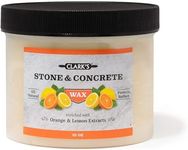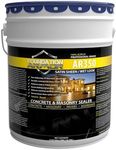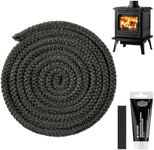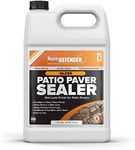Buying Guide for the Best Paver Sealers
Choosing the right paver sealer is important to protect and enhance the appearance of your outdoor surfaces, such as patios, driveways, or walkways. The right sealer can help prevent stains, resist weather damage, and make cleaning easier. To find the best fit, you should consider the type of pavers you have, the look you want to achieve, and the level of protection you need. Understanding the key specifications will help you make an informed decision.Sealer TypeSealer type refers to the chemical base of the product, most commonly water-based or solvent-based. Water-based sealers are easier to apply, have less odor, and are more environmentally friendly, making them suitable for most residential uses. Solvent-based sealers tend to provide a glossier finish and deeper color enhancement, but they may have stronger fumes and require more careful handling. Your choice should depend on your preference for finish, ease of use, and sensitivity to odors.
Finish (Gloss Level)The finish or gloss level describes how shiny or matte the surface will look after sealing. Options typically range from natural/matte, to satin, to high-gloss. Matte finishes preserve the natural look of the pavers, satin adds a slight sheen, and high-gloss creates a wet, shiny appearance. If you want to keep the original look, go for matte; if you want to highlight colors and add shine, consider satin or gloss. Your aesthetic preference and the style of your outdoor space should guide this choice.
Protection FeaturesProtection features include resistance to water, oil, UV rays, and stains. Some sealers are designed to block water and prevent mold or weed growth, while others focus on resisting oil stains from vehicles or food. UV protection helps prevent color fading from sunlight. Think about the main threats to your pavers—like heavy rain, lots of sun, or frequent spills—and choose a sealer that offers the right kind of protection for your environment.
BreathabilityBreathability refers to the sealer's ability to let moisture escape from the pavers while still providing a protective barrier. Non-breathable sealers can trap moisture, leading to white haze or damage over time. Breathable sealers are especially important in areas with high humidity or where water can get underneath the pavers. If your pavers are in a damp area or you notice moisture issues, prioritize a breathable sealer.
Longevity (Durability)Longevity or durability indicates how long the sealer will last before needing reapplication. Some sealers last one to two years, while others can protect for up to five years or more. The durability depends on the product type, weather conditions, and how much traffic the area gets. If you want less frequent maintenance, look for a sealer with a longer lifespan, especially for high-traffic or exposed areas.
Application MethodApplication method describes how the sealer is applied—by roller, sprayer, or brush. Some sealers are easier to apply and dry faster, while others may require more preparation or multiple coats. If you prefer a simple, DIY-friendly process, look for products labeled as easy to apply or single-coat. For larger areas, a sprayer can save time, while rollers or brushes may be better for small or detailed spaces.

